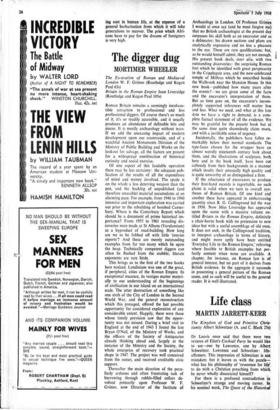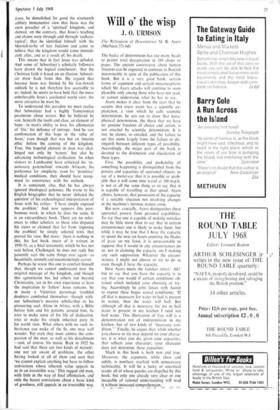The Kingdom of God and Primitive Chris- tianity Albert Schweitzer
(A. and C. Black 25s)
Life class
MARTIN JARRETT-KERR
Dr Leavis once said that there were two reviews of Eliot's Cocktail Party he would like to see—one by Lawrence, one by Albert Schweitzer. Lawrence and Schweitzer: life- affirmers. This impression of Schweitzer is not mistaken; but it leaves us with the puzzle— what has his philosophy of 'reverence for life' to do with a Christian preaching from which he never wholly dissociated himself?
For there is a profound contradiction in Schweitzer's strange and moving career. In his seminal work, The Quest of the Historical
Jesus, he demolished for good the nineteenth century immanentist view that Jesus was the mere preacher of a 'spiritual' kingdom, and showed, on the contrary, that Jesus's teaching and claims were through and through 'eschato- logical'; that he identified himself with the Messiah-to-be of late Judaism and came to believe that the kingdom would come immedi- ately after, and as a result of, his death.
This means that in fact Jesus was deluded. And some of Schweitzer's scholarly followers have drawn the logical conclusion: that the Christian faith is based on an illusion. Schweit- zer drew back from this. He argued that because Jesus was limited by his late-Jewish outlook he is not therefore less accessible to us; indeed, he seems to have held that the more unbelievable Jesus's accidental world view, the more attractive he must be.
To understand this paradox we must realise that Schweitzer had a highly Tennysonian pessimism about nature. But he believed he saw, beneath the tooth and claw, an element of hope—in man's ability to love, his affirmation of 'life,' his defiance of entropy. And he saw confirmation of this hope in the 'ethic of Jesus,' even though that was but an 'interim ethic' before the coming of the kingdom. True, this hopeful element in man was chal- lenged not only by 'nature,' but also by advancing technological civilisation. So when visitors to Lambarene have criticised his 're- actionary paternalism' towards Africans, his preference for simplicity, even- for 'primitive' medical conditions, they should have recog- nised its consistency with his outlook.
It is consistent, also, that he has always ignored theological polemics. He wrote to his English biographer that he never 'debated the question' of his eschatological interpretation of Jesus with his critics: 'I have simply exposed the problem.' And now appears this post- humous work, in which he does the same. It is an extraordinary book. There are no refer- ences to other scholars, to those who disputed his views or claimed that far from 'exposing the problem' he simply selected texts that proved his view. But more: there is nothing in this, his last book (most of it written in 1950-51, as a final testament), which he has not said before. Challenged, he does not reply but patiently says the same things over again—as beautifully, serenely and unconvincingly as ever.
Perhaps he wrote this one to comfort himself that, though we cannot understand now the original message of the kingdom, and though this agnosticism has led others out beyond Christianity, yet in his own experience at least the inspiration to 'follow' Jesus remains. So in many a Victorian parsonage troubled doubters comforted themselves—though with- out Schweitzer's massive scholarship or his pioneering zeal. Alone in Africa, with a Bible before him and his patients around him, he tries to make sense of his life of dedication, tries to make his simple inherited piety fit his world view. What others with no such in- heritance can make of the fit, one may well wonder. Yet even they must admire the com- passion of the man, as well as his detachment —and, of course, his music. Back in 1922 he had said that there are two kinds of naïveté: one not yet aware of problems, the other having looked at all of them and seen that 'we cannot explain anything but have to follow convictions whose inherent value appeals to us in an irresistible way.' This rugged old man, with little in the way of final affirmation, and only the barest convictions about a basic kind of goodness, still appeals in an irresistible way.











































 Previous page
Previous page